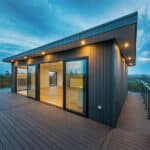Choosing Between uPVC and Wooden Panels for Your Project
The choice between uPVC (unplasticized polyvinyl chloride) and wooden panels can significantly influence the aesthetics, durability, and overall performance of your project. Both materials have their unique qualities and applications, making the decision an important one. In this article, we’ll explore the attributes of uPVC and wooden panels, helping you make an informed choice that aligns with your specific project requirements.
1. Material Composition: uPVC and Wooden Panels
uPVC Panels: uPVC panels are constructed from rigid, non-plasticized vinyl. This material is known for its durability and resistance to moisture, UV rays, and environmental stressors.
Wooden Panels: Wooden panels, on the other hand, are crafted from natural wood. They exude warmth and character but can be susceptible to moisture-related issues.
2. Durability
uPVC Panels: uPVC panels are renowned for their exceptional durability. They do not rot, warp, or corrode, making them ideal for applications in high-moisture or fluctuating temperature environments.
Wooden Panels: Wooden panels, while durable, require regular maintenance to prevent issues like rotting, warping, or damage from insects. They may need sealing or painting to maintain their structural integrity.
3. Aesthetic Appeal

uPVC Panels: uPVC panels offer a modern, sleek appearance. They come in various colors and finishes, lending a contemporary touch to both interior and exterior spaces.
Wooden Panels: Wooden panels evoke a natural, timeless charm. They create a warm and inviting atmosphere and are often chosen for their classic, rustic look.
4. Maintenance
uPVC Panels: uPVC panels are low-maintenance. Regular cleaning is sufficient to keep them looking pristine, and they are resistant to staining.
Wooden Panels: Wooden panels demand periodic maintenance, including sealing, staining, or painting to protect against moisture and maintain their finish.
5. Insulation
uPVC Panels: uPVC panels offer excellent insulation properties, contributing to energy efficiency. They help regulate temperatures and reduce noise.
Wooden Panels: While wood has natural insulating properties, it may not be as effective as uPVC in extreme weather conditions.
6. Environmental Impact
uPVC Panels: uPVC is recyclable, and the environmental impact of its manufacturing process has improved over time. However, it is a plastic-based material.
Wooden Panels: Wood is a renewable resource, but the environmental impact can vary based on the source. Sustainable wood sourcing is essential for minimizing the environmental footprint.
7. Cost
uPVC Panels: uPVC panels are often cost-effective due to their durability and low maintenance requirements.
Wooden Panels: The cost of wooden panels can vary significantly based on the type of wood, quality, and finish. In some cases, wooden panels may be more expensive.
Frequently Asked Questions
uPVC panels are made from non-plasticized vinyl, and wooden panels are crafted from natural wood. They are used in various applications, including interior and exterior wall cladding and siding.
uPVC panels are made of durable, non-plasticized vinyl, while wooden panels are crafted from natural wood. uPVC panels are resistant to moisture, UV rays, and environmental stressors, whereas wooden panels may require more maintenance to prevent rot, warping, or insect damage.
uPVC panels offer a sleek and modern appearance, while wooden panels provide a warm and inviting atmosphere with a classic, rustic look.
uPVC panels are low-maintenance and require regular cleaning. Wooden panels may need periodic maintenance, such as sealing, staining, or painting, to protect against moisture and maintain their finish.
uPVC panels provide excellent insulation properties, helping regulate temperatures and reduce noise. Wooden panels have natural insulating properties but may not be as effective in extreme conditions.
uPVC is recyclable, and its environmental impact has improved over time, but it is a plastic-based material. Wooden panels’ environmental impact can vary based on sourcing; sustainable wood options help minimize the footprint.
uPVC panels are often cost-effective due to their durability and low maintenance requirements. The cost of wooden panels varies based on wood type, quality, and finish and may be more expensive in some cases.
To make an informed decision, consider the specific requirements, aesthetic preferences, and budget of the project. Evaluate the benefits and drawbacks of uPVC and wooden panels to select the right material for the project’s needs.
Conclusion
The choice between uPVC and wooden panels is a pivotal decision that should align with your project’s unique requirements, aesthetic preferences, and budget. While uPVC panels offer durability, low maintenance, and a contemporary look, wooden panels provide a classic, organic aesthetic but require more upkeep. Carefully evaluate the benefits and drawbacks of each material to ensure you select the right panels for your project.












